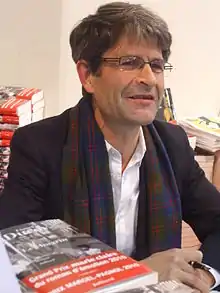Lionel Duroy
Lionel Duroy de Suduiraut (born 1 October 1949) is a French writer and journalist born in Bizerte (Tunisia)[1] into an impoverished family of aristocratic origin who long shared extreme right-wing ideas. His youth in this environment left a profound mark on him and was the breeding ground for many of his books. (Priez pour nous, Le Chagrin). Lionel Duroy was first a delivery man, a courier, a worker, then a journalist at Libération and at L'événement du jeudi. Since the publication of his first novel in 1990, he has devoted himself entirely to writing novels with an essentially autobiographical content.[1] He is happy to talk about his mother, the family trauma linked to his father's war wounds and the legal expulsion of his family from their home in 1955 - following a lack of solidarity from the rest of the family.

He is a ghost-writer for many celebrities who wish to publish their autobiographies.[1][2]
In 2013, his novel L'Hiver des hommes made him the winner of the prix Renaudot des lycéens 2012 and the Prix Joseph-Kessel 2013.
Works
- Hienghène, le désespoir calédonien. Paris: Barrault Éditions. 1988. p. 319. ISBN 9782736000875.
- L'Affaire de Poitiers. Paris: Barrault Éditions. 1988. p. 272. ISBN 978-2736000769.
- Priez pour nous. Paris: Barrault Éditions. 1990. p. 356. ISBN 9782736001230.
- Je voudrais descendre. Cadre rouge. Paris: Éditions du Seuil. 1993. p. 138. ISBN 9782020206358.
- Il ne m'est rien arrivé. Bleue. Paris: Mercure de France. 1994. p. 179. ISBN 9782715218772.
- Comme des héros. Libres. Paris: Fayard. 1996. p. 119. ISBN 9782213596037.
- Mon premier jour de bonheur. Paris: Éditions Julliard. 1996. p. 221. ISBN 9782260014348.
- Des hommes éblouissants. Paris: Éditions Julliard. 1997. p. 268. ISBN 9782260014577.
- Un jour je te tuerai. Paris: Julliard. 1999. p. 229. ISBN 978-2260015116.
- Trois couples en quête d'orages. Paris: Éditions Julliard. 2000. p. 224. ISBN 9782260015413.
- Méfiez-vous des écrivains. Paris: Éditions Julliard. 2002. p. 287. ISBN 978-2260015772.
- Le Cahier de Turin. Paris: Éditions Julliard. 2003. p. 232. ISBN 9782260016267.
- Écrire. Paris: Éditions Julliard. 2005. p. 136. ISBN 9782260016915.
- Le Chagrin. Paris: Éditions Julliard. 2010. p. 548. ISBN 9782260018094. – Prix François-Mauriac de la région Aquitaine 2010, Grand prix Marie Claire du roman d'émotion 2010, Prix Marcel Pagnol 2010
- Colères. Paris: Éditions Julliard. 2011. p. 212. ISBN 9782260019145.
- Survivre avec les loups. La véritable histoire de Misha Defonseca. Paris: XO Édition. 2011. p. 238. ISBN 978-2-84563-415-2.
- L'Hiver des hommes. Paris: Éditions Julliard. 2012. p. 355. ISBN 978-2-260-01916-9.
- - Prix Renaudot des Lycéens 2012
- - Prix Joseph-Kessel 2013[3]
- Vertiges. Paris: Éditions Julliard. 2013. p. 480. ISBN 978-2-260-02114-8.
- Échapper, Paris, Julliard, 2015, 277 p. ISBN 978-2-260-02137-7
- L’Absente, Paris, Julliard, 2016, 360 p. ISBN 978-2-260-02922-9
- Eugenia, Paris, Julliard, 2018, 394 p. ISBN 978-2-260-03046-1
In collaboration
- Stéphane Moles (1980). Paroles de patrons. Paris: Éditions Alain Moreau. p. 93. ISBN 9788485848003.
- Thierry Huguenin (1995). Le 54e. Le Rescapé du massacre de la secte du temple solaire. Paris: Éditions Fixot. p. 251. ISBN 9782221080450.
- Destin Nord. Paris: Éditions Robert Laffont. 1998. p. 144. ISBN 9782221087411.
- Íngrid Betancourt (2001). La Rage au cœur. Paris: XO éditions. p. 250. ISBN 9782744147975. (Prix spécial du Jury Prix Vérité), 2007
- Farah Pahlavi (2003). Mémoires. Paris: XO Éditions. p. 432. ISBN 978-2845630659.
- Raioaoa Tavae (2004). Si loin du monde. Paris: Oh ! Éditions. pp. 173. ISBN 9782915056068.
- Sylvie Vartan (2004). Entre l'ombre et la lumière. Paris: XO Éditions. p. 400. ISBN 9782744173196.
- Mireille Darc (2005). Tant que battra mon cœur. Paris: XO Éditions. p. 349. ISBN 9782744188107.
- Tarita Teriipaia (2005). Marlon Brando, mon amour, ma déchirure. Paris: XO éditions. p. 301. ISBN 9782744180675.
- Dominique Wiel (2006). Que Dieu ait pitié de nous. Paris: XO Éditions. p. 253. ISBN 9782915056433.
- Nadia Volf (2006). J'ai choisi la liberté. Paris: XO Éditions. p. 301. ISBN 9782845633100.
- Jean-Marie Bigard (2007). Rire pour ne pas mourir. Paris: Oh ! Éditions. p. 244. ISBN 9782915056419.
- Nana Mouskouri (2007). La Fille de la chauve-souris : mémoires. Paris: XO Éditions. ISBN 9782845633117.
- Sylvie Mathurin (2008). Un amour absolu. Paris: Oh ! Éditions. p. 272. ISBN 9782915056709.
- Gérard Depardieu (2014). Ça s'est fait comme ça. Paris: XO Éditions. p. 176. ISBN 9782845637320.
References
- Jérôme Garcin. "Les confessions de Lionel Duroy". Retrieved 23 June 2019.
- "Les nègres littéraires sortent de l'ombre". Retrieved 23 June 2019.
- "Lionel Duroy remporte le Prix Joseph Kessel 2013". actualitte.com. Retrieved 23 June 2019..